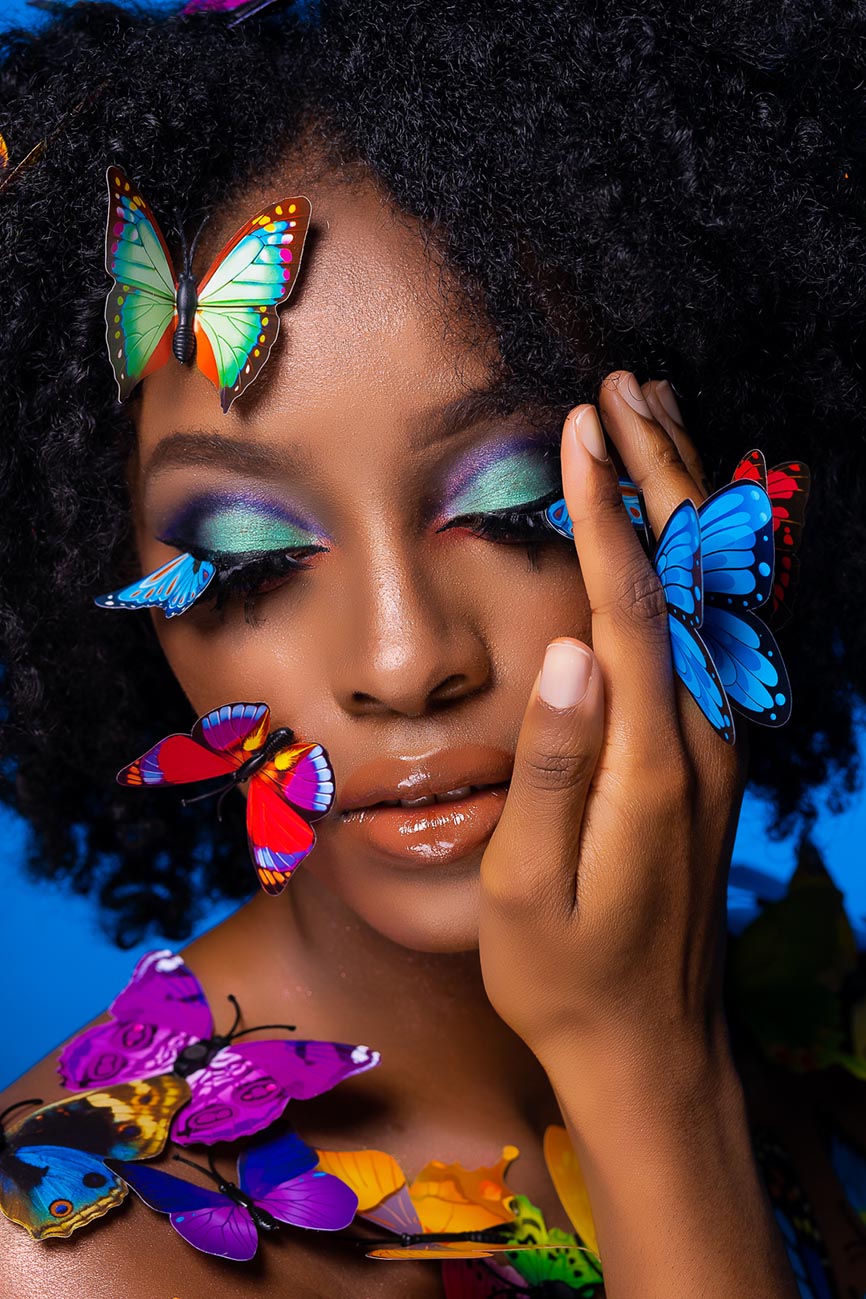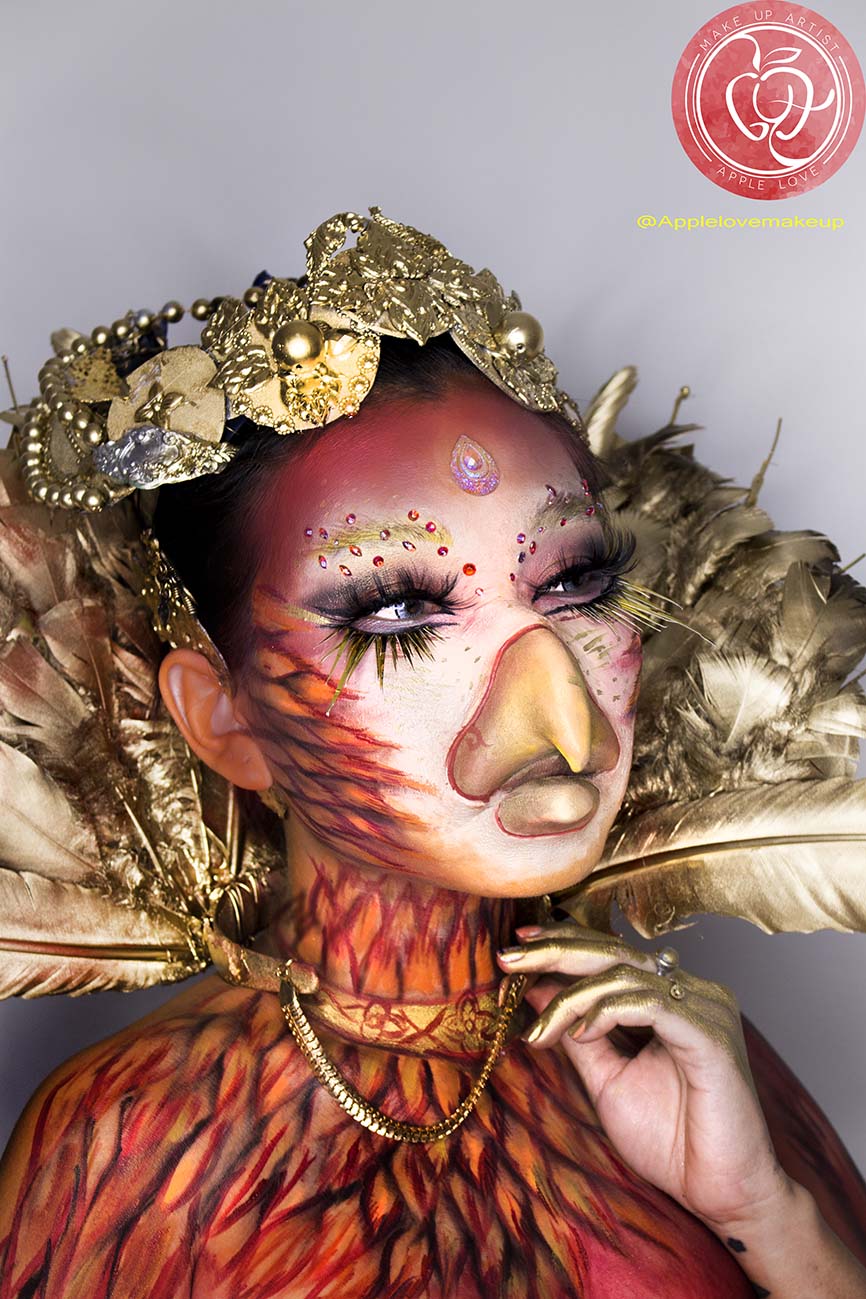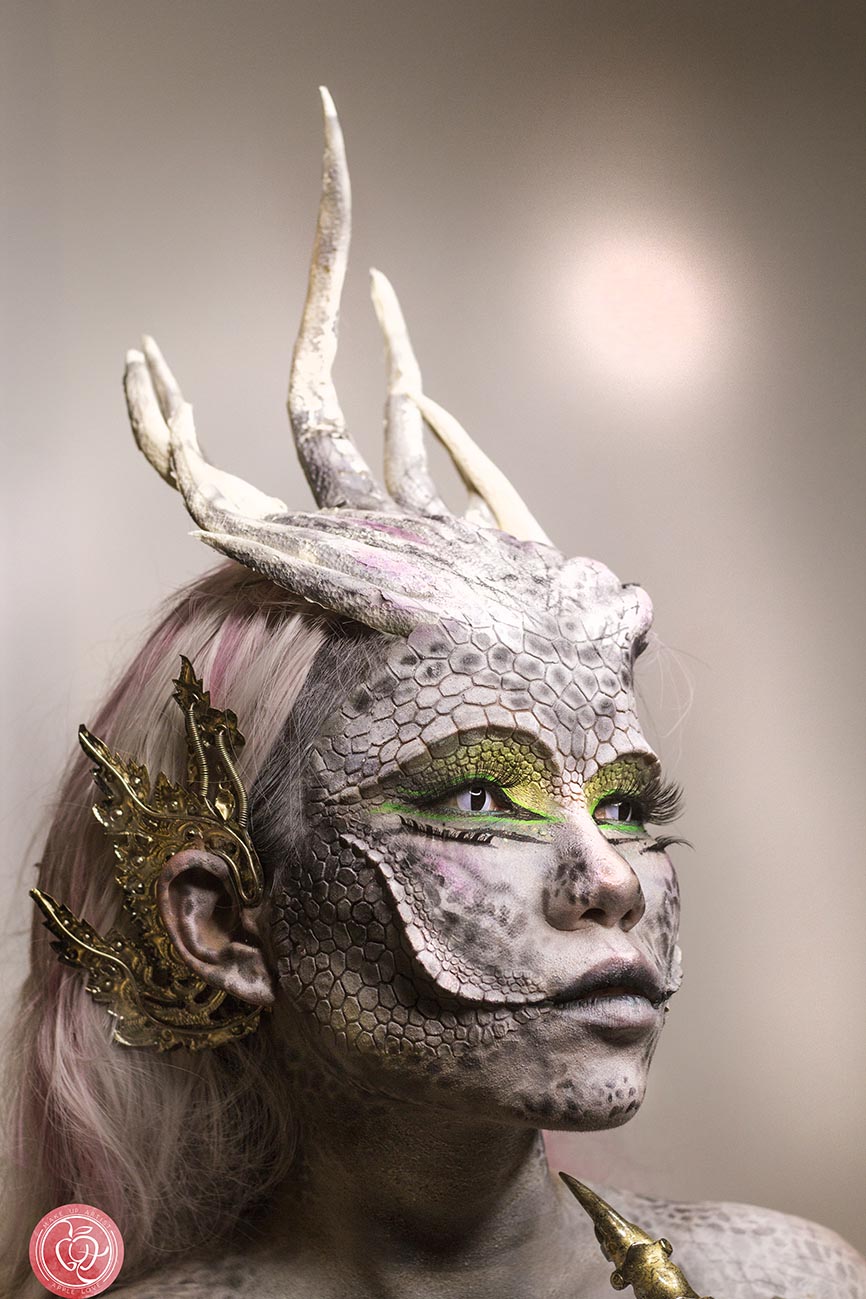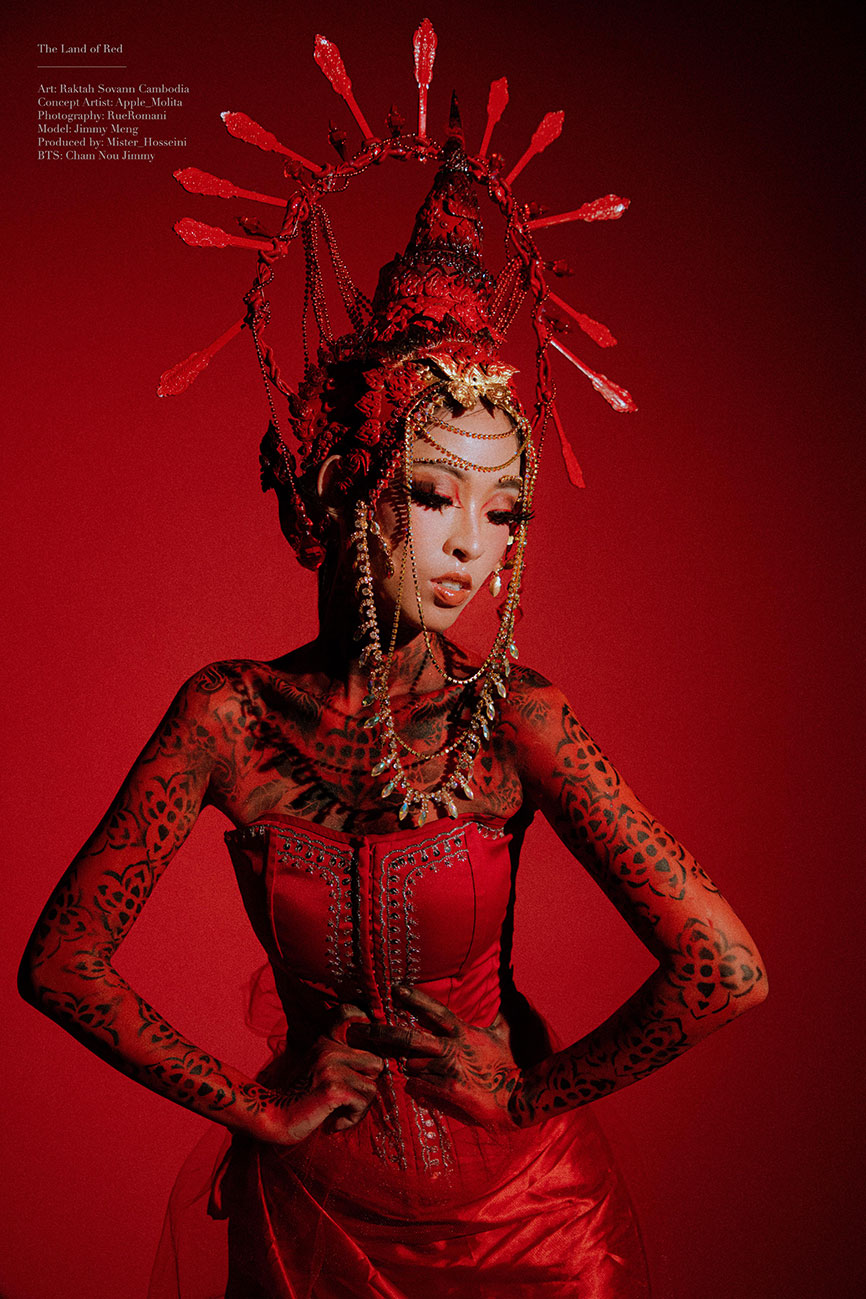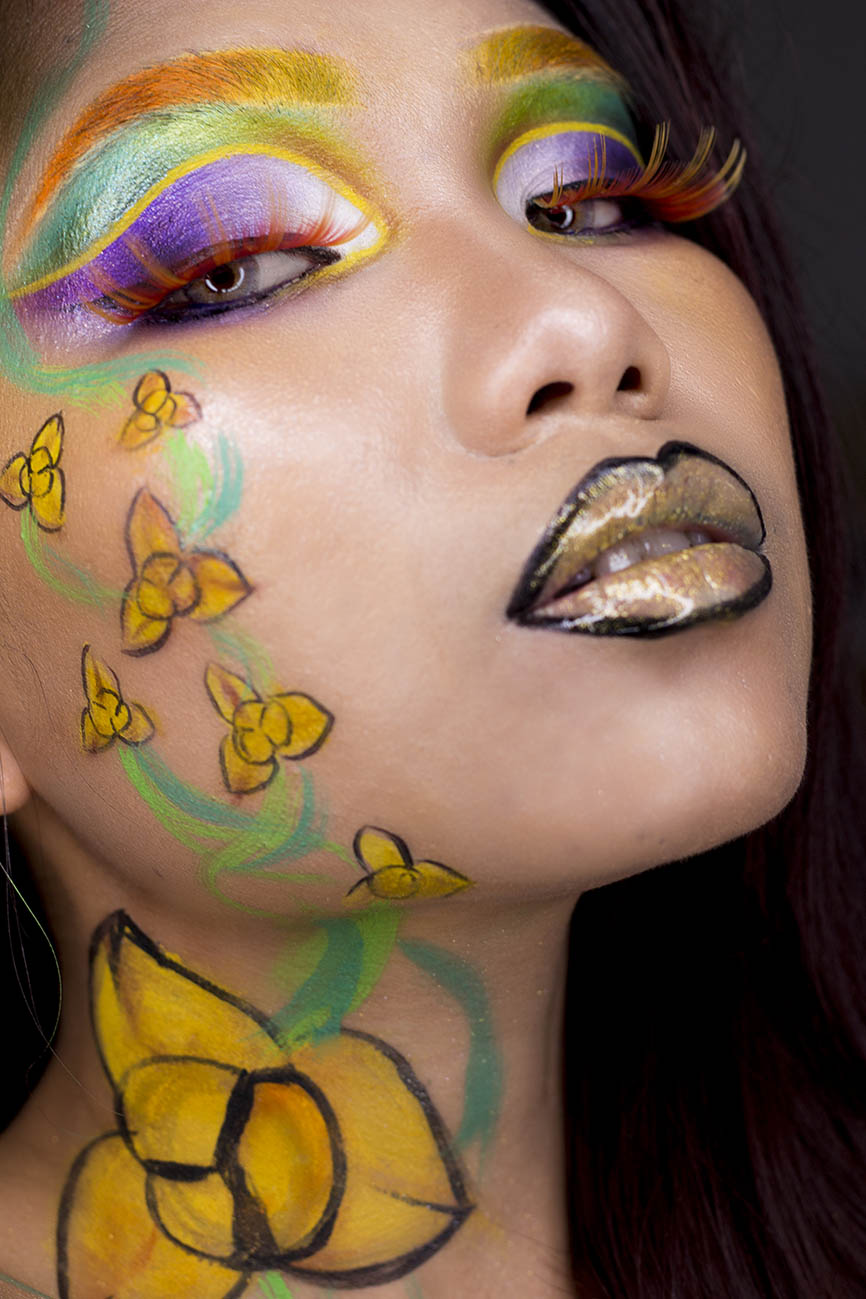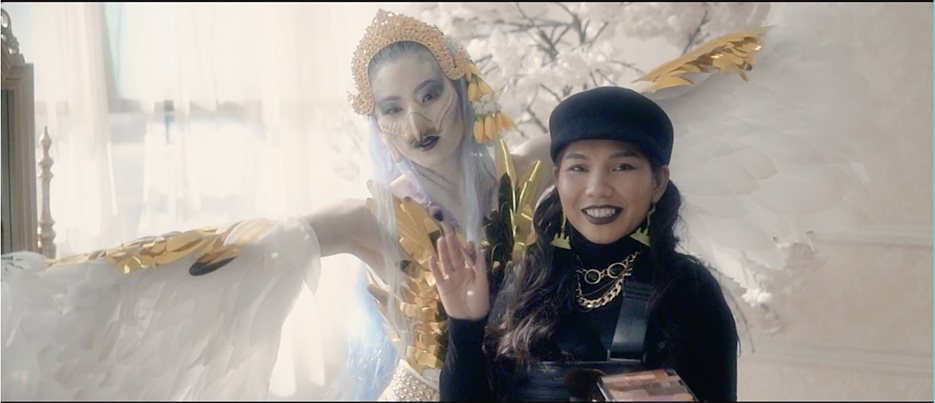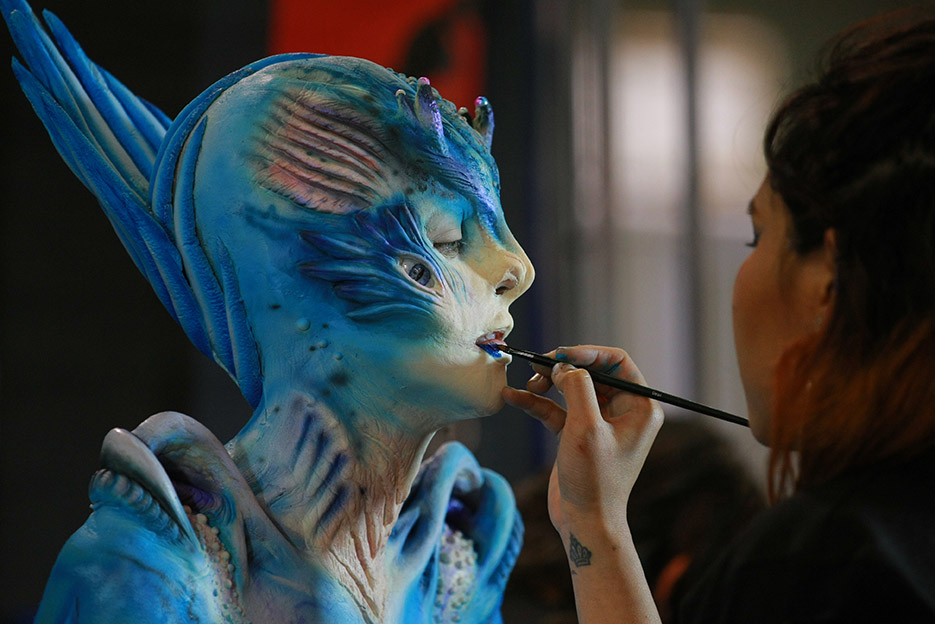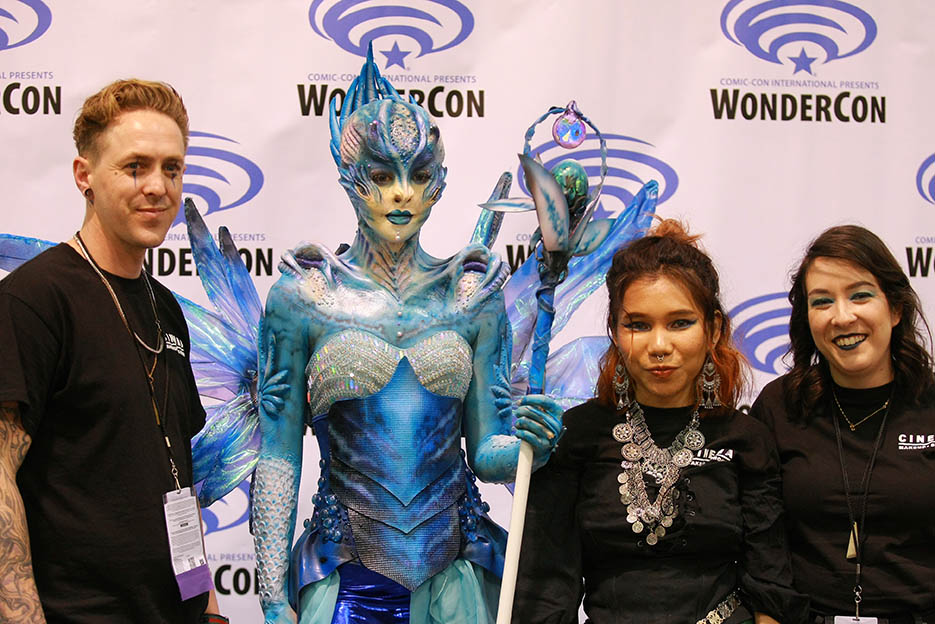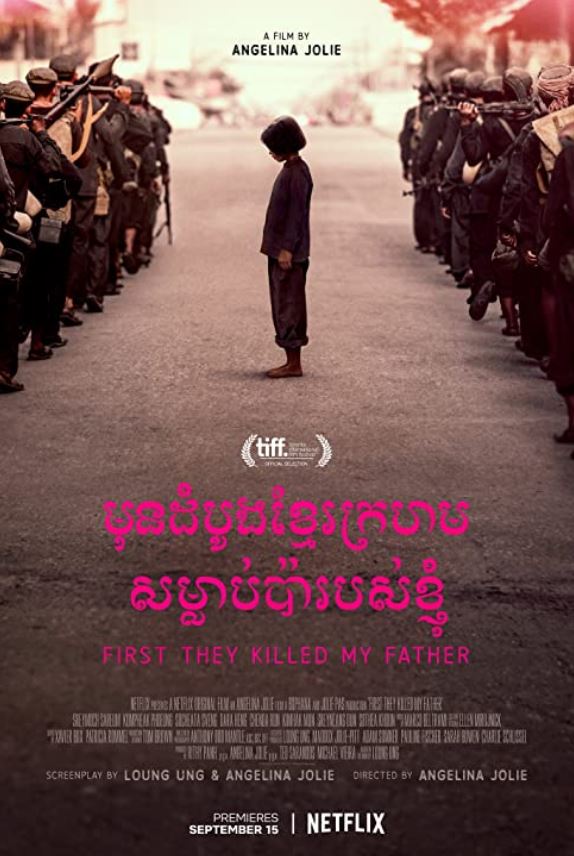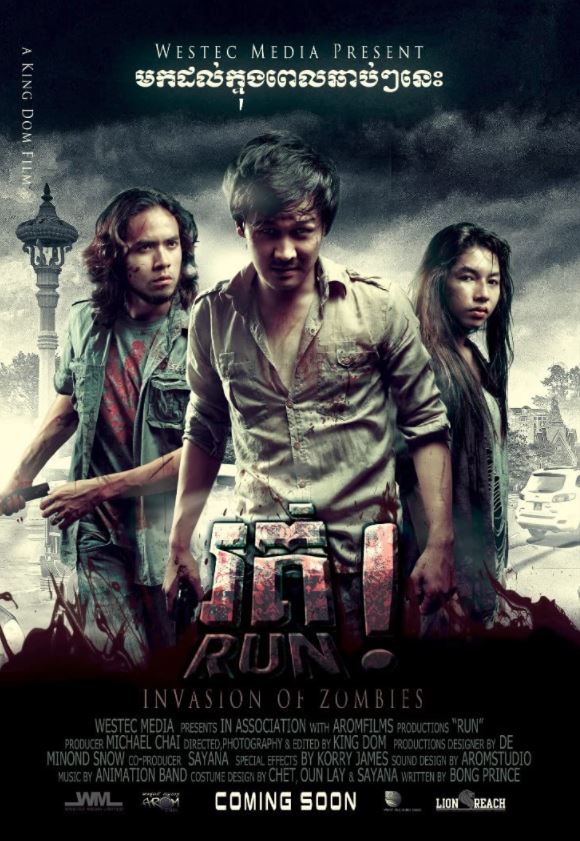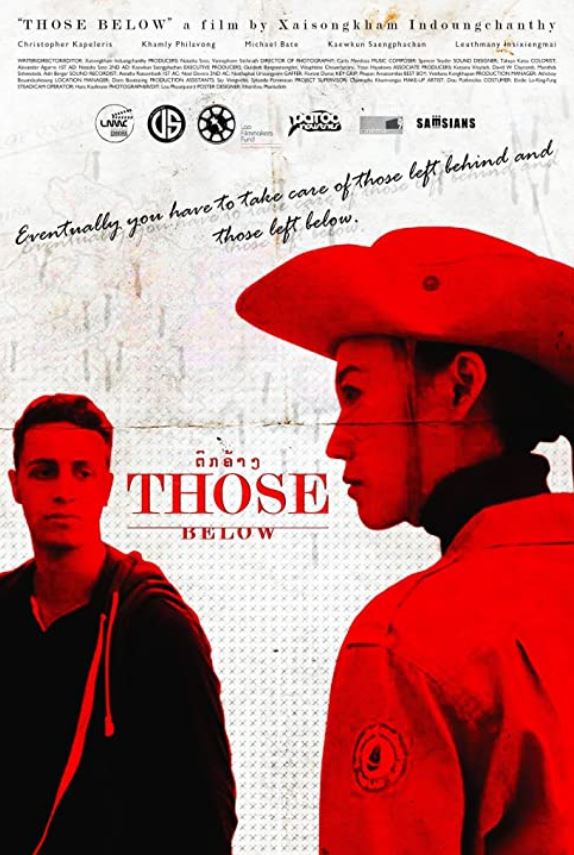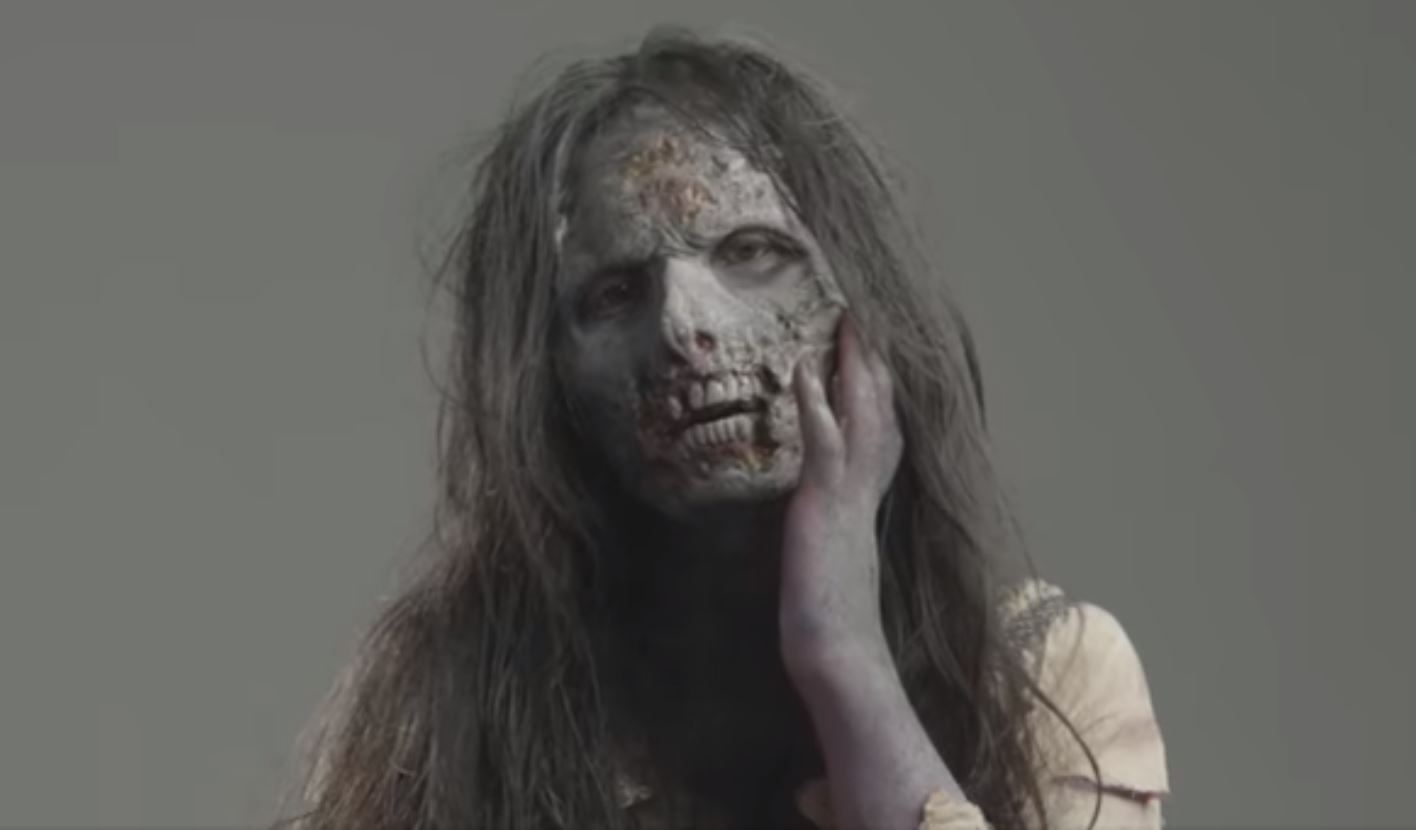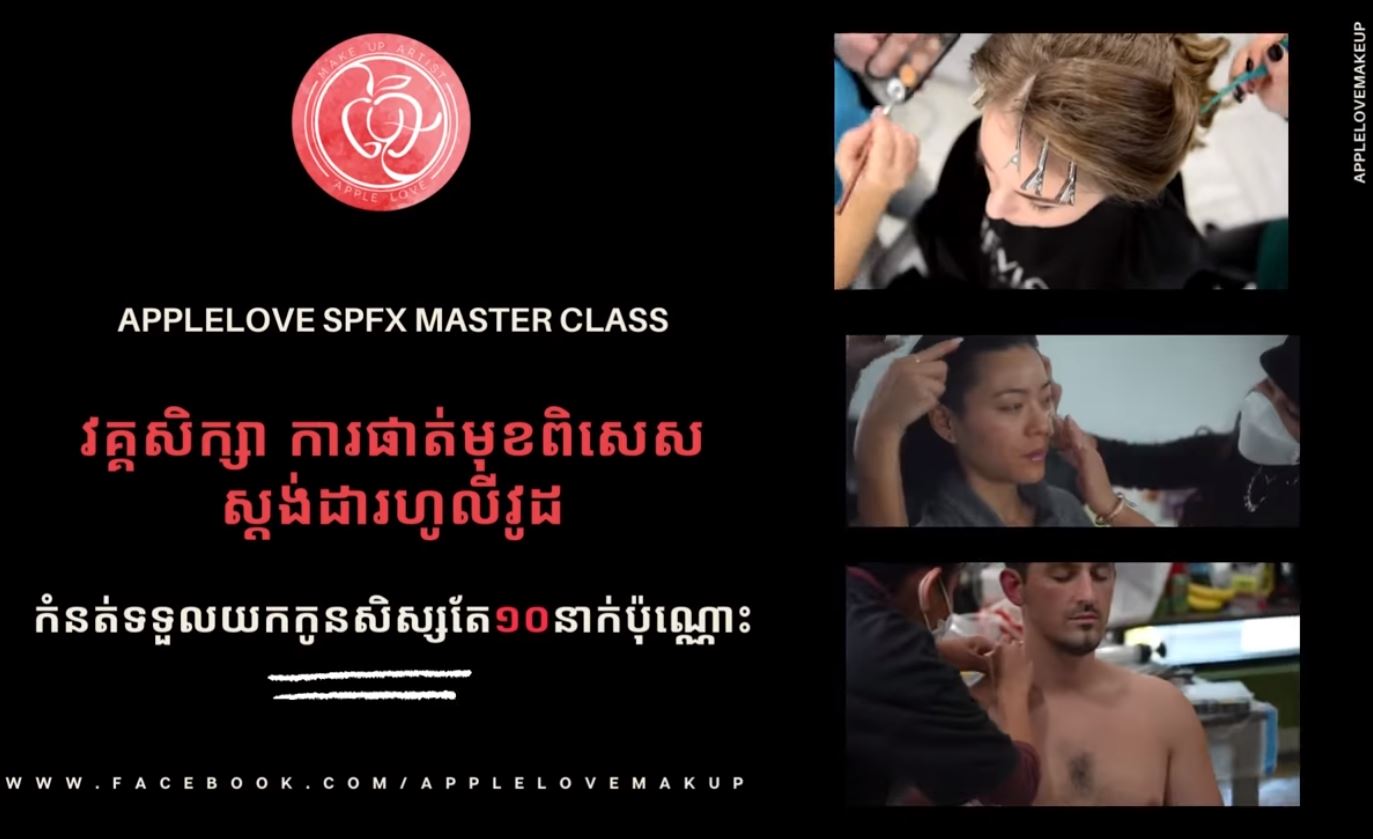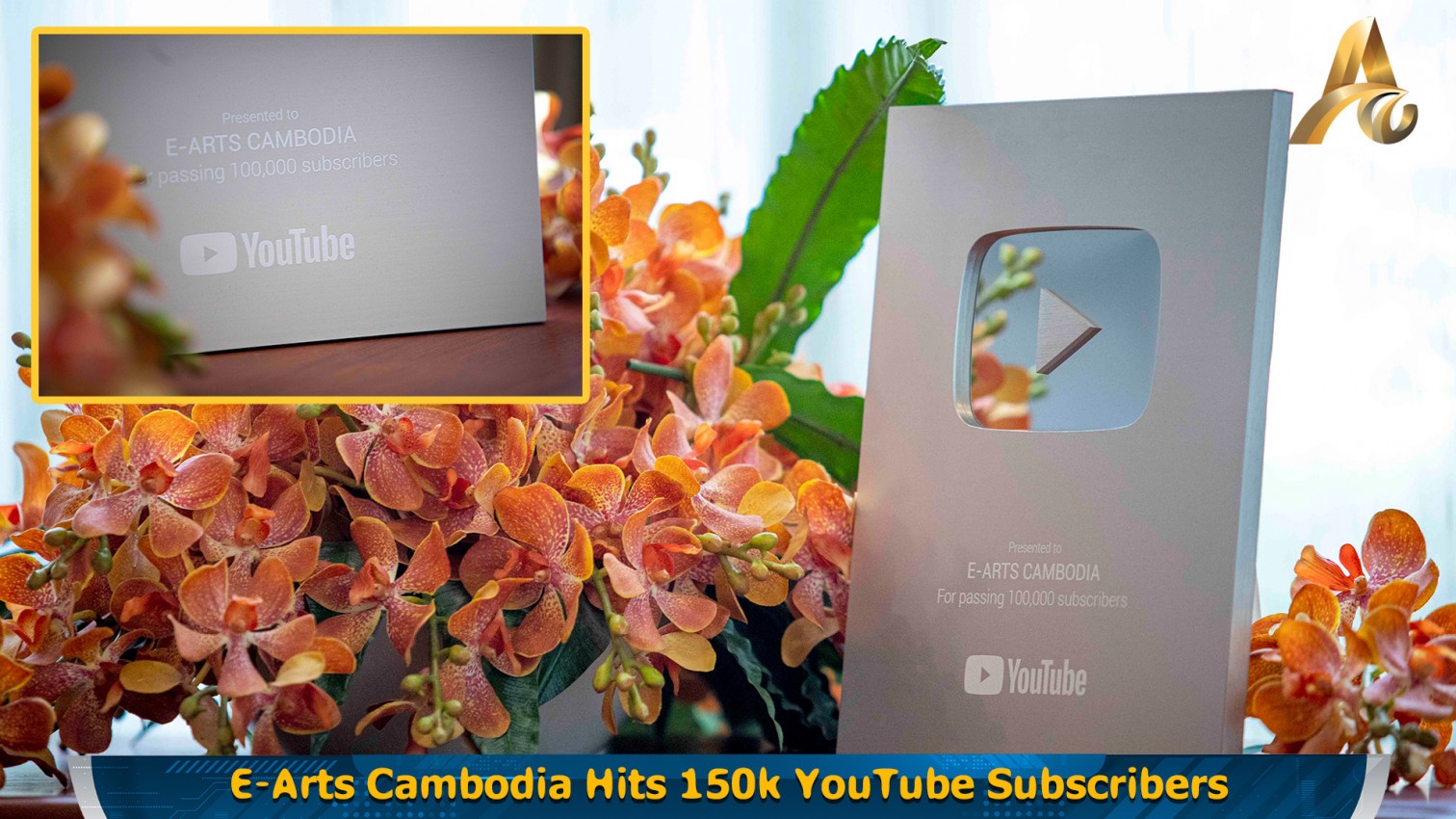PHNOM PENH: Born as Dou Pothmolita, the world knows her as Apple, the most famous Cambodian make-up artist. Apple traveled back to her homeland to visit her family and friends and to give back to the community. Here is an exclusive interview of her life, career, and advice brought to you by EAC Entertainment.
THE INTERVIEW
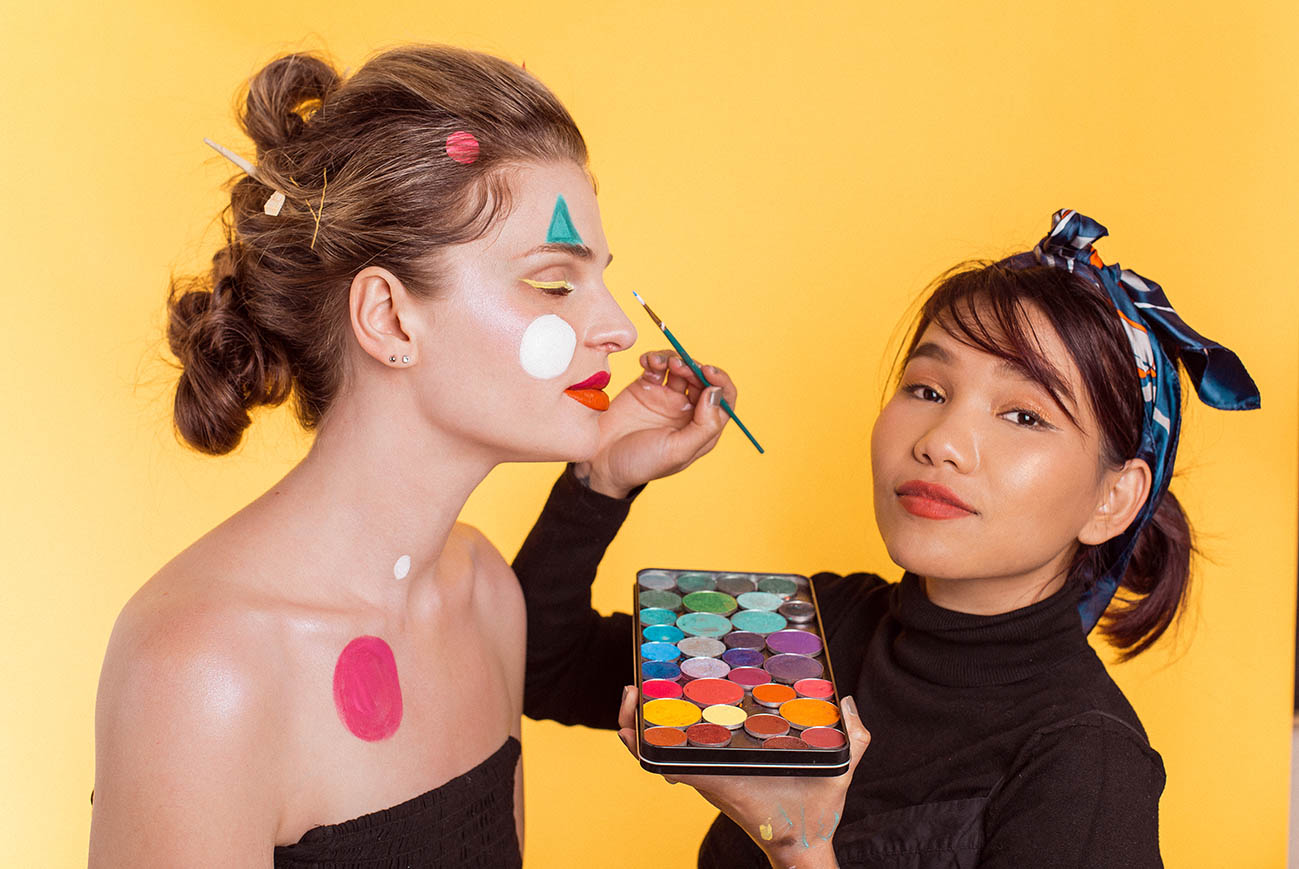
DEKA: Thank you for taking the time to be with us. What made you choose the name “Apple”?
APPLE: I like “Apple” because as you know Cambodia doesn’t have apples. As soon as I grow up and I get to taste an apple, I’m like oh my god, this is an amazing fruit. So, it was like a fancy fruit for a special occasion for my family because we were really poor, only Khmer New Year or special occasion could we afford an apple. Normally, I get a slice of it. Cut to my college years, I came to Phnom Penh and got [allowance] from my mom every month. I would eat an apple every day, and my Australian teacher had a hard time pronouncing [my birth name] and said he was going to call me “Apple” because I had an apple on my table every day. I thought it was a really nice name and also, it’s a tribute to my English knowledge because it brought me to my career. Without education and English, I wouldn’t be here today. I go with Apple as a reminder. It’s the first letter when I learned English and it’s my favorite fruit.
DEKA: Aww, that’s cute. What was your journey like into becoming a make-up artist?
APPLE: Funny story, I never thought that I would be a make-up artist. My mom used to introduce the idea when I finished high school but I didn’t know much about it. I didn’t want to run around [because I thought] what a make-up artist does is running around on set, touching people’s sweat. I would like to be sitting in an office, being respected as having a good education and traveling the world. I just didn’t see the job as I see it right now.
So, I never thought about doing it. But one day my friend made a zombie film and asked me to help. I was on my summer break from college. I could help but I didn’t want to be an actor so I was like I’ll do make-up. And a zombie film, we had hundreds of volunteers. It was really fun actually. So, I started researching how to do, you know, fake zombie thing using whatever is at home–ketchup or food color, and then I realized that it was really fun. So, I was like okay, I can do this. I started getting hired and flew to Singapore, Thailand, and Laos–getting free hotels. It was not bad. Good pay and I really enjoyed it…
I’ve been very passionate about social issues and I can see that if I work in film and contribute to meaningful projects, I can send messages through art and film without being vocals in political ways. So yeah, that’s how I became a make-artist.
“I’ve been very passionate about social issues and I can see that if I work in film and contribute to meaningful projects, I can send messages through art and film”
DEKA: You taught yourself a lot of things here. How did you go to school in America?
APPLE: In 2016, I had the chance to work with Angelina Jolie’s First They Killed My Father. The crew found me on social media and got me to be a personal assistant to the head department. After the project finished, I was seeking higher education for makeup. I was introduced to this makeup school in Los Angeles, California. They have scholarships every year. There was a good chance that I could win. So, I took the chance and applied for it. I ended up getting top 5 among 2000 to 3000 make-up artists around the world every year competing for that scholarship; it was the best makeup school in Hollywood. One year later, with savings and a lot of sponsors and crowd-funding, I had enough budget to fly to LA and graduated from Cinema Makeup School. As the name implied, the school focused on cinema makeup and TV [makeup]. We studied designing a character digitally, sculpting in real life, making prosthetics, and you know, working on set in general. I graduated in 2018, and I’ve been working in Hollywood since then.
DEKA: As one of the fewest Cambodians to make it in Hollywood, what would you advise people to do in order to make it too?
APPLE: That's a good question. I had a lot of that question. How would Cambodian filmmakers join Hollywood? Um, I really, have a strong belief that all of us [can]. When I work in Hollywood, I always thought like, one of my friends that I know in Cambodia would do this amazingly, like with less budget and so much more effective. I'm sorry to all the Hollywood team, but I kept thinking if only I can bring my friend from Cambodia and do all this with me right now, I could make this, I could make that. I think, um, I see the potential of the opportunity of growing as a filmmaker in Cambodia, um, given to people, especially even me. Um, but sometimes it's hard to make them see themselves. How far they could be. I take time sometimes to reach out to people that I see that they could go to Hollywood level, and I see that they are stuck because when you get really good at one point you had to keep going, right? But then if you're not expanding outside, where would you go? Because I was there. I wasn't able to, I got stuck. I'm like, what do I do now? Because the local team don't want to, you know, local team think I'm too expensive. I need to go further. So, I would reach out.
So, the first thing I would say is to, to know that you are actually good, you actually because comparing to a lot of, um, privilege, I would say to a lot of other people in Hollywood, that they can access, with all these education material equipment, they still probably do all these decent work.
So, you know, we are self-taught. We come from nothing. We had to learn a different language. We make ourselves to do all this. We actually have a lot of advantages. We are flexible. We can deal with stress better because we know what we've been through in Cambodia. We probably do 24 hours per day and didn't sleep and we still kept going.
So that mental power actually even better than any film crew I ever work with. We actually worked really hard. So, I would say. Believe in yourself that you are actually at that level. Don’t think that the other people, because they are raised differently, the race, and color, and country, the region, they are actually better than us.
We actually could be better if we just put attention on learning, and especially language skills, and also learn about culture, keep networking. Education, like I say, normal education, even like the way we write an email, right? The way we talk to people, represent ourselves as a person, not just the skill that we have, could help us really far with our, um, journey.
Okay. The other thing that I think that it's really helpful, for a young filmmaker in Cambodia is to save all their portfolio. Right. I’ve seen that we had a lot of work and they keep working, but they were too shy to ask for credit. They are too shy to save all their work in one file and show people and talk about themselves and like, hey, look at this, I did this, I did this. A lot of them–a lot of us as artists get really shy when it comes to talking about ourselves because we don't feel like, you know, it sounds really obnoxious like, oh, I'm so good at this. But sometimes it does help at the right time and right moment and the right sentence and the right setting. Um, so collect all your work.
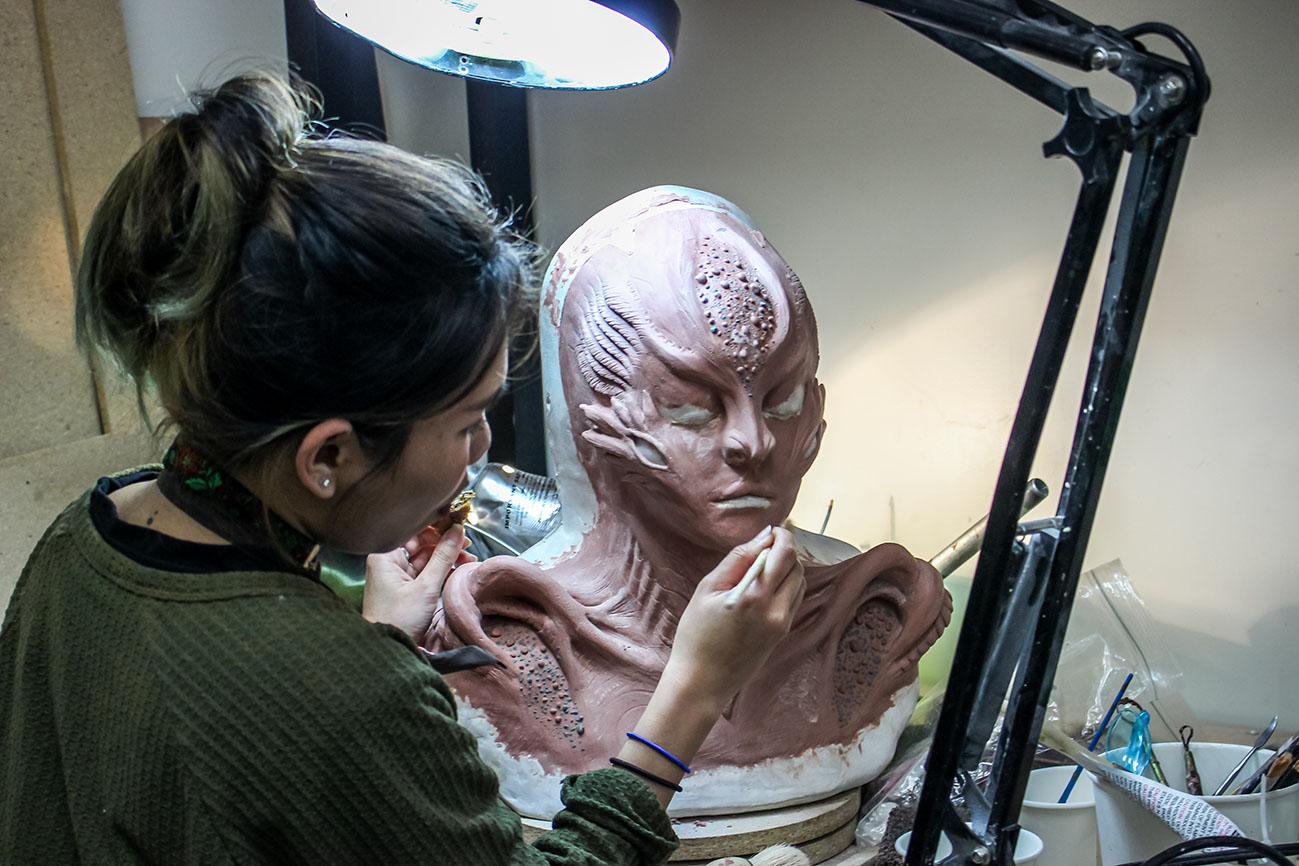
With makeup artists, I take photos of all my work, bad or good. I save it so I can look at it and I can tell myself, wow, it was so bad. Oh, wow. It was so good. Um, it helps us grow and it helps us when it comes to the right job and opportunity to catch it, we can show to the potential hire, clients, or producers. Look what I can do.
When I met a few artists and I asked, where is your website? Or where are your portfolio? Where's your reel? They didn't have it. They did a lot. They did short films, projects, videos, whatever their job is, is all over the place. They didn't put it in one file and imagine somebody wants to hire you. Where can they know what you could do, right? Where can they access to your portfolio? If you don't have something to represent. With social media right now, it makes everything so easy. Just make a page, just make a website. It's free. Put things in one place, a small video on YouTube. When they say they want to see what you could do, send them a link. One-click away. You get a job; hired. That's just like a really small skill besides your skill on set itself, right? It's just that networking, that diplomatic side of us to connect with outsiders will bring us really far.
I would say the last thing is keeping an eye on scholarships. Scholarship happened every day, everywhere. If you don't apply for it, somebody will do. Um, so I want to collect your portfolio together. Wait for the opportunity, scholarship come, send your portfolio with it, you got it, and then you be there. They just need to see what we could do. So that what we could do to really put it together nicely and get ready for the opportunity, you know, to come.
“Put [the portfolio] together nicely and get ready for the opportunity”
So I think that is the way that we can reach the potential standard and at the same time, enjoy all this. Enjoy all the free teams you have. Free location, free, um, project. A lot of us come for coffee and a plate, like, you know, drinking coffee, like make a short film and enjoy that. You would not have that in Hollywood. A lot of people, even students, had to spend a thousand dollars to make a short film. Cambodia has all these free. It’s really nice because we all work from the heart right. I saw that actually amazing. I miss that, I actually miss working with my friends and just coming up with a small project at a coffee store, and it's such a meaningful project.
Those are actually amazing for a portfolio when you need to apply for a better job and bring yourself to an outside international level.
DEKA: So, prepare yourself for the right opportunity.
APPLE: Look for it. I would say I have a friend that always gets a scholarship in New York. See, she's graduated from NYU. I saw a Cambodian woman, uh, her word that stuck with me and that also gave me the scholarship. Take a day. When you think about wanting a scholarship, take a day, go to a coffee shop, search for scholarships, search for it, spent just that one day, search for it. If you look for a film to work on, search for it. You actually can go on Facebook and join LA film crew and see what they do over there because they will post about what they do over there. Everything is with the click of your hand, search for it. Submit. Sending emails, then you will be there.
DEKA: That’s awesome. What is the working environment in Hollywood like?
APPLE: The first two years were really different. I’ve already been working in Cambodia for seven years then. So Cambodian productions are more homie, are more family-like. One person does like five things and is flexible, you know, whatever comes our way. We were like a really strong team. There was a lot of sentimental value for me that I grew up here.
Hollywood is really different. Everything is professional. Everybody just sticks to what they do. If you do sound, you just do what you do. The production has more quality and higher value but less as a family. We still worked really hard together, but because we were so busy doing our own things, we didn’t really get to know each other as much. The first two years were a little lonely, I would say. I was looking for the community I belong to–culture shock, you know, a lot of culture shock–culture difference. America is a mixing pot of everything, especially California, a lot of things that I need to learn to adjust to.
But because like I said, I’m thankful that I’m able to speak English, so my knowledge of this second language helped me a lot to communicate. I think I’m doing better right now. I start to appreciate all the hard work of everybody more. I start learning how to connect with all the crew–not on set because we’re all busy but then we make time to meet each other after set and stuff like that. It’s actually becoming really fun for me.
DEKA: That’s great. Glad things turned around. You have been in this industry for over a decade now. What are some career highlights or memories that really stick out to you?
APPLE: So, I started in 2011. It was a lot. I don’t know how many faces I paint and makeup on. But I have some favorite moments that like changing my career. The first would be the first film I’ve ever done because it introduced me to a whole new world of being a makeup artist. Without that zombie film, Run! and the team that I grew with, right now some of us are still friends. We’re still looking out for each other on social media. We all have amazing futures. All of us are doing amazing things, you know. We just grow together from that small project. I remember it’s such a sweet memory because we all volunteered shooting in an abundant building, and we were the first zombie film ever in Cambodia. So, it means a lot to me.
After that, a lot of projects taught me how to work with different crews and different teams. But I think one of the outstanding moments was a photoshoot that I did in Singapore. Being able to leave the country and know that my art can bring Cambodian art to another country meant a lot to me.
The other one is when I did a film in Laos with a Fulbright scholarship winner, also, the first Laos director that got that scholarship for directing. He came back to Laos to make a film with maybe eleven people in the crew. We were shooting in a province called Xiangkhouang. The whole province is full of bombshells. We were shooting in a real mine, bombing area. The film was also a tribute to Laos history, the war, and stuff like that. The crew was from around the world. We had a Filipino crew who I actually met in LA last year and worked together again. That project also taught me how much power a film can pull people together and how much a two-minute film means to the local people. The same thing, I connect to people from different cultures on that project, and we still also keep in touch and watch each other grow from that one too.
“How much power a film can pull people together and how much a two-minute film means to the local people”
And then, of course, the Angelina Jolie’s film, which is like my life-changing [project], without that film, I wouldn't be wanting to go to Hollywood and do all this stuff that I do.
Then I think, after I graduate, I did this film that we won an award for a Young Filmmaker for HBO, and we got second place for that one. The film was about Chinese-American immigrants. Because during that time, when I first moved to America, after I graduated, I was looking for meaningful projects as I did in Asia. And I was having a hard time finding a community. And what kind of film that I'm passionate about that, um, I know I love Sci-fi, it's entertaining, but… it also doesn't relate to me personally. So, when I did that film, because it's about immigrants and about family, about Asian culture, um, then we win the award. Also, the crew was also Asian American. A lot of us are Chinese American, Filipino, Indian, and then I found a new passion, new inspiration, and a new family that I like, okay, this is what I want to do.
So since then, I've been working a lot with Asian projects because also Asian actors had a hard time having a good makeup artist, you know, matching skin color. And because I'm experienced with a lot of a variety of skin tones, I was able to do quite a good job for Asian skin tone. Southeast Asians, we have really little, um, access to a lot of good makeup artists in Hollywood. When I found that out, I can do that. And so, I've been just working with a lot of Asian films right now. I just did the Hmong film. Finished a Hmong feature film, which is also the first Hmong feature ever. Um, so yeah, that was some of my career highlights. Yeah.
DEKA: I’m surprised that you left out Brad Pitt.
APPLE: (Laughs) Okay. A little story just for this interview. I did take a photo with him because my ex was obsessed with him. And I did that just to annoy him.
DEKA: What is some advice that you have for the new generation of makeup artists in Cambodia? Things you have learned from this whole journey.
APPLE: Um, I had seen a lot of makeup artists starting doing makeup and I really like it. I'm really excited to see the future of the new generation because now we are opening up to, um, the world. Different types of art and story. And so now our teenagers, the young generation get to see a lot through social media. I would say for a lot of young makeup artists that I see doing things right now, it's actually really great and going in the right direction.
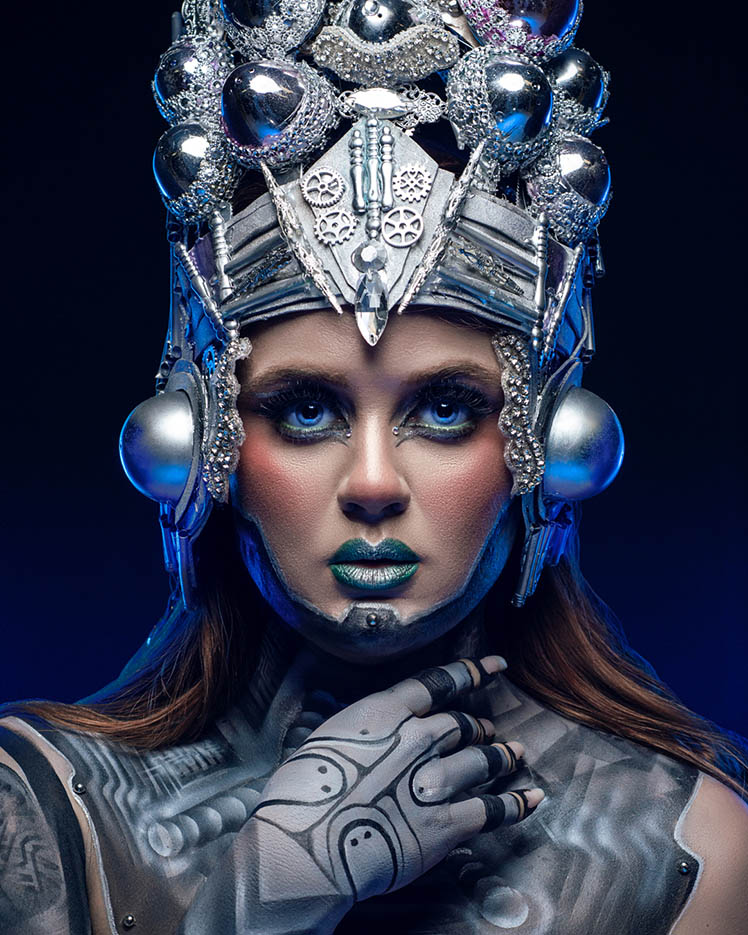
But I feel like, um, the only thing that I would say from my personal experience is while we are obsessing over and enjoying a new culture. I feel like our base, our tradition, our culture, our history should be also a really strong base before we even reach out to different, you know, the arts of the world, because it's actually, for me, it means a lot when artists can do and understand their own culture first because I like to compare the artist to a tree. So, if you have a really strong root, and I've been saying that again and again, if you can dig into your root and understand your own history and culture and get a really strong base, no matter how far you grow, you would be a really strong tree. But if you just keep thinking about growing really tall, but you didn't really touch base with whatever, you know, your history and culture. You gonna lose your identity, and there are another million other makeup artists around the world from different countries already. But the one from Cambodia that understands and uses Cambodian art combined with, um, with this new technology is still limited.
So why don't we just observe what we have? We have such a rich culture. So, like, while we were looking at everything around us, like try looking at what we have. And I think that is something I want to send to the new generation, learn about our culture first, like make it strong and understand our own history.
“We have such a rich culture. So, like, while we were looking at everything around us, like try looking at what we have.”
So where will we go in the world? I'm Cambodian. I know where I'm from. I know my whole history. Be like, you know, be really detailed about it, learn about it. So, I think that's gonna make them go really far. Yeah.
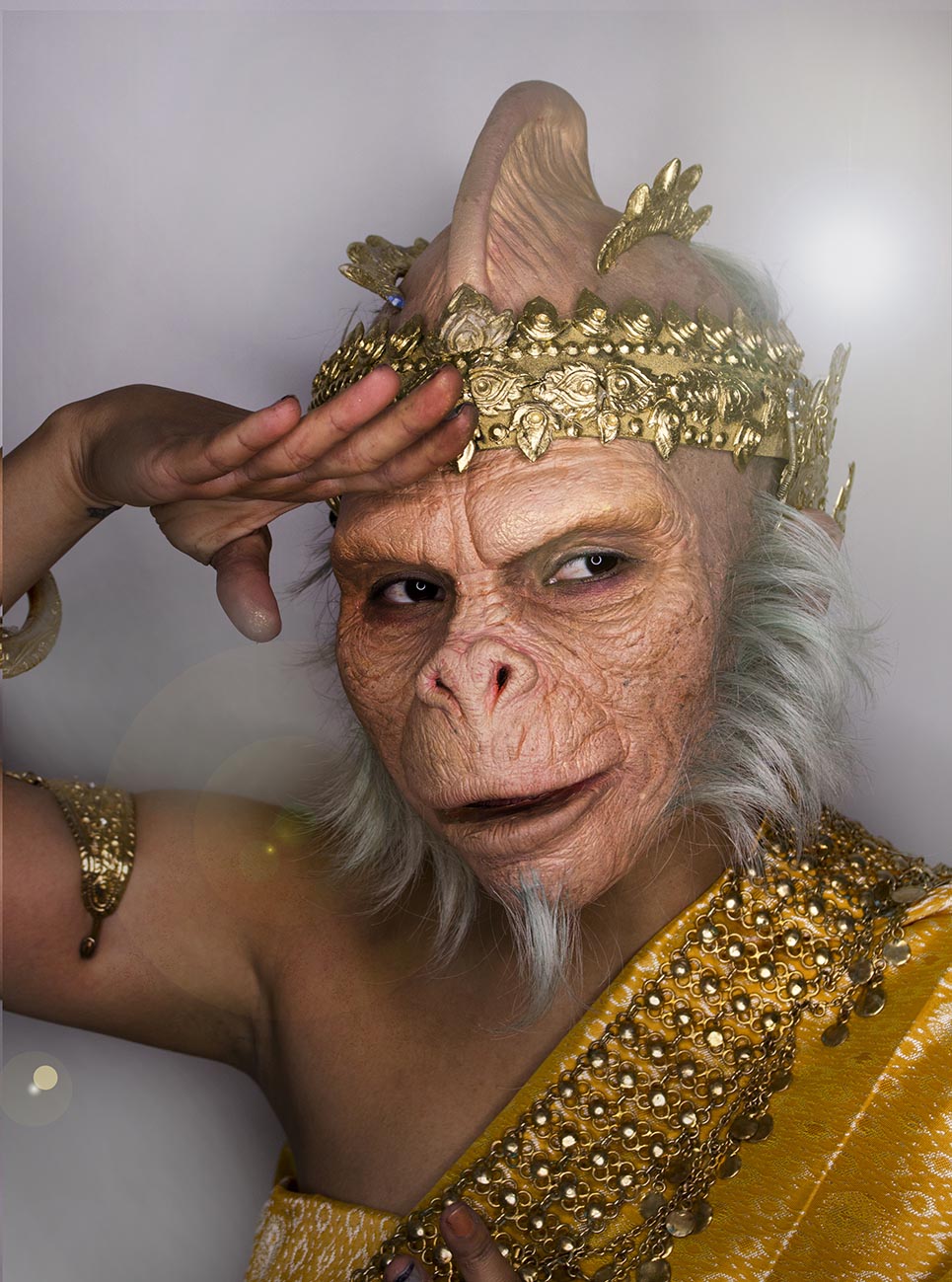
DEKA: Yeah. And we see that in your work, from Apsara to Kinnaris, and all that. So, let's talk a little more about your work. You work mostly in prosthetics, but I've seen that you also do head dressers. Was that a part of your education or did you branch out on that after school?
APPLE: Um, I think I was kind of like, along the way, especially during the pandemic, there was like part of me that I want to do something that I could put on social media and entertaining, while people staying at home, being locked down.
And I kind of force myself to learn to make all those, because, you know, we have to limit contact with people, and I start making my own thing. Um, a lot of times when I come up with an idea of, I want to be this character or that character. I have this excitement that I wanted to have it right now, I want it the next two days or the next three days. I want it, I want to see it because I have a picture in my head. So, because of that, a really impatient feeling, it forced me to learn how to make all those, because I know exactly what I want. I'm not really good at it, but I get to put it together myself. I feel the satisfaction. That the thing that I want, comes together and that, I dunno, because in LA also like everybody has specialized in different things and they take time, right? And I don't want to disrespect another artist that makes headdress and like, I want it to the next day. And everybody, of course, busy with their own thing. So, making it myself, actually help me, you know, the labor and expressing my art.
But I would say if I get to access, like in Cambodia, we have all these headdresses and clothing that you can rent, if I get all that and the team can help me, I wouldn't do it. But because I have no choice; so, I made it. Um, yeah, so that's how I make all those headdresses and costumes, but it's not my specialty.
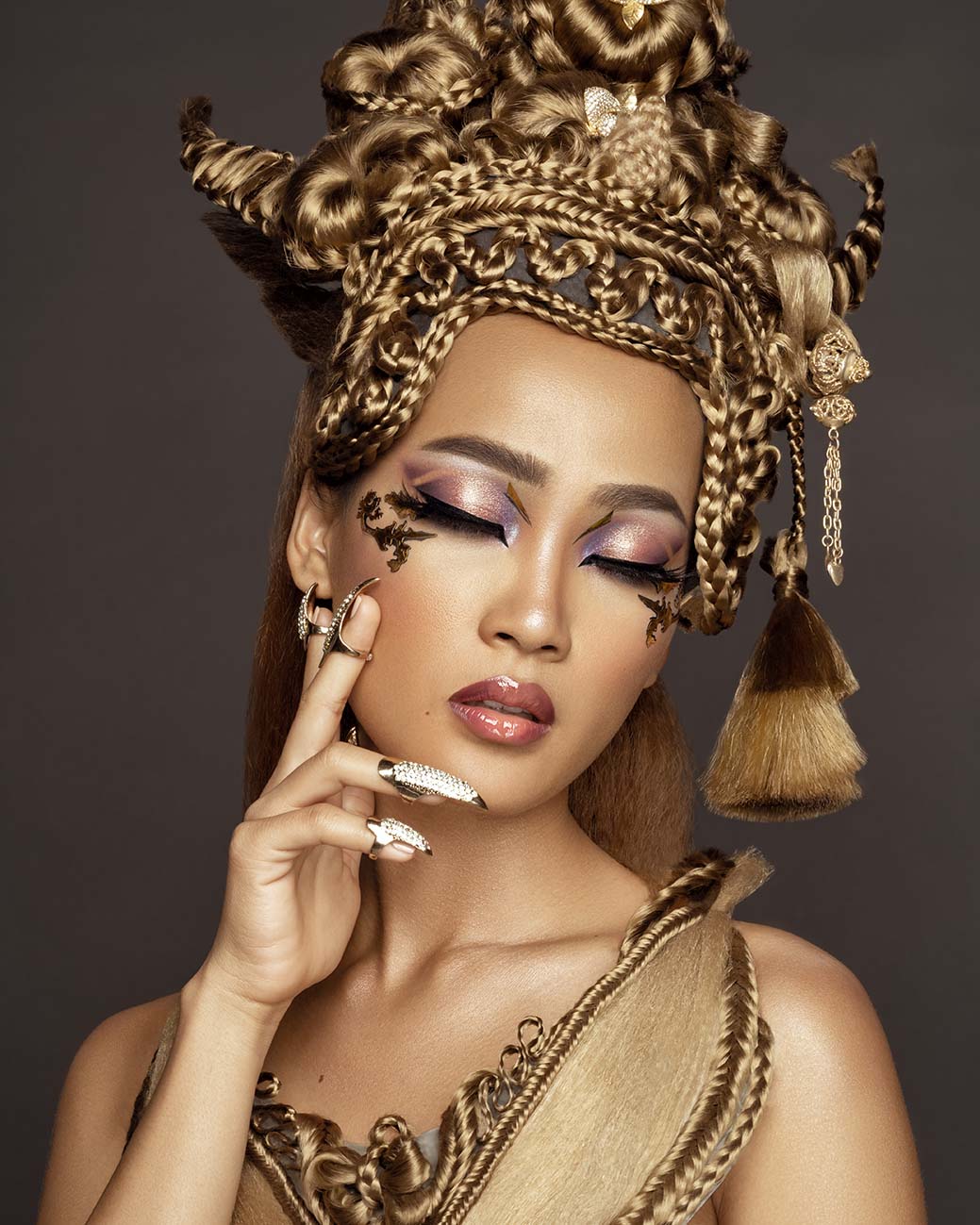
DEKA: The pictures of Reth Sarita that I've seen with the hairdressers, they were lovely. How long did it take you to do them?
APPLE: So, the one for Sarita is all made from hair, right? Um, I think I spent at least a week for each piece, all day. Because if you zoom into the headdress, it's all hair braiding one by one and then built it together. And it's like probably this tall (Gestures high above her head). Unfortunately, I wasn't able to take pictures for it because of the studio size. We weren't able to take pictures of her whole head, but the headpiece go a whole way really far. Um, so each of those took me like almost a week. I had a lot of time from COVID. So, I'm like, yeah, just take my time and do this.
Right now, I'm trying to make it like a few more, um, similar styles that inspire, but I don't have a week to just braid the hair anymore. So, it's actually like COVID, of all the bad thing that happened, that's one good thing is the time for me to braid those headpieces. And it’s actually amazing that I wait almost half of a year to find the right actress to wear it.
I made that headdress and I have a photographer reaching out. We want to shoot together, but we couldn't find a Cambodian, um, model. Um, and based on my experience, I did an Apsara robot, um, inspired makeup, and the model was beautiful, but I wasn't able to find a Cambodian person to represent Cambodian culture. So, I determined to find a Cambodian woman to wear the headdress. It means a lot.
I had this moment when I was doing the hair because Apsara headdress was really respectful in our culture. So, I actually prayed that I would get a good model and I get this wind blow, when I was sitting, a really strong wind. And then I'm like, oh, my ancestor is taking care of me.
It's so fun. Surreal. And I probably just sit around the swimming pool and saw it, uh, this crazy thing in my head. But I feel like I'm doing the right thing and probably there’s a spirit taking care of me. And I wait and wait and wait and when Sarita was in the US, I texted her while you are in LA, we should do a photoshoot together. And she's like, yeah. And it happened. And it turned out perfect that we got the Miss Universe Cambodia to wear the crown. So, the project was actually really awesome.
DEKA: That’s awesome Yeah, I didn't know that you’d made the headdress before you met her. Okay, cool. So how many hours do you normally take to do a prosthetic then?
APPLE: Um, I don’t think we did prosthetics on Sarita for that one.
DEKA: No, for normal prosthetic.
APPLE: A normal prosthetic for film normally takes from two and a half-hour that is if it's small pieces, just a cheekbone, a little body painting, and two artists working together on the talent. Um, it could take up to eight hours for a full body with four artists working on it. If you look at some characters from X-Men like Mystique or, um, the character in Guardians of the Galaxy or some really big makeup like that, it could take around like four or five hours, a lot of makeup artists working on one talent. So, some of my alien characters or Sci-fi could take that much, like three hours.
We'll always try to save the production some times. Um, we'll also always warn them how long it's gonna take, if you want it to look good. Um, if we do it long enough, um, or we have a little time to practice or do a makeup test, it's normally we can cut down the makeup time to two hours and a half.
Um, still the production can have time to shoot because normally shooting time is only 10 hours. So, we take that much for makeup. We take a lot of time for production. Yeah. But it's yeah. It's a lot of times. Yeah.
DEKA: So recently you shot a short film called “Dead Inside”. How long did it take for you to do the zombie makeup?
APPLE: Um, that's actually only [took] an hour, but also, we had three people. Um, I was fortunate to have really awesome assistants. They don't have much experience with makeup, but they have passion and that's actually helped a lot when it's come to building a team.
So, um, I found, really two awesome makeup assistants to help me on that day. So, we actually did it for only one hour and a half, just for the whole-body paint. Um, my assistant had made the costume and the clothes, like we make it old and aged it before the shoot already. And we prepaint the prosthetic for the color base and stuff like that. So, it saves us a little time. Yeah.
DEKA: Okay. So, what inspired you to do “Dead Inside”?
APPLE: It was my first project that I come back to Cambodia. It happened to be [International] Women’s Rights day, and I'm really passionate about women’s rights.
As soon as I landed, I got comments left and right about my weight, about my skin color. It's really funny because I understand the cultural difference, but it's been also five years that I didn't hear anybody comment about how I look. Normally people focus on my skill. I'm not the person’s, you know, interests, but I just want them to look at my work, not me. And also, I think in America, um, one of the few good things is people really aware of what they say to each other.
Um, so. I feel pretty good. Um, my confidence had grown a lot. I'm older now. I don't care a lot about how I look as much. Um, you know, less vanity (Laughs) which also frees your soul a little bit, because I used to be insecure because living here, you had to know about, um, when you go to a social event and you had to care about a lot about how you look and always prepping all the time, right? But I'm different and I think that's a part that I grow as a person.
But as soon as I landed here. I actually realized how much people put pressure on women. Um, how you look in a certain way, your body, your skin color. I got a comment asking, why don't you have whitening lotion in America? Why are you not lighter? You know, why are you getting bigger, chubbier? Um, because I'm sweating more because the weather is hotter and stuff like that. They like maybe you just fat. As much as I prepped myself because I know that’s gonna happen. It's still shocking.
“I actually realized how much people put pressure on women.”
And then I think I’m like, okay, this is a good chance for me. I have a zombie prosthetic. Um, it's Women’s Rights day, and I want to be able to speak, you know, for a lot of women that went through the whole thing. So, during the shooting process, I asked all the women in my team, which is like 99% of the team was actually women to write down what hurtful words they got from people throughout their life, in high school, or whatever people say that actually scar them. So, they all wrote those notes. So, when you look at the clip, all the notes that I put on the actress are actually from the woman in the team. They share what, um, they've been, uh, you know, called; they've been bullied at school.
It's a really nice project. We did it really quickly just for a day. It happened. Everybody's scrambling to help each other. I did it. It's up. I love it because I miss doing spontaneous projects like that and it's actually really fun for me.
DEKA: Since you came to Cambodia, you spent time with your family and friends and did this project. You are also about to do a workshop to help the makeup artists in Cambodia to learn more about special effects. Can you tell me more about the workshop?
APPLE: Yeah. So, for my workshop, the Apple’s Special Effect Makeup Masterclass. Oh my God, it's so long. It's going to be for four days. Um, the class focused on training special effects makeup artists' basic skills. I surveyed around 20 filmmakers, directors, and actors that I know in Cambodia to see what actually essential skill they need the most in film.
Um, a lot of them need a makeup artist to be able to do a really good bald cap, to make somebody look bald. We have a lot of stories related to monks or shaving their heads, or somebody getting sick. But, um, the application skill from our local makeup artists are still limited because of material and, um, the education, you know, that they can find on the internet.
So bald cap, making an actual scar, or making somebody look older. Um, old-age makeup that’s what we call it. I am actually not able to, you know, reach that level of professionalism with all these cameras right now that we have, HD cameras. Makeup artists have a lot of pressure, even the ones in, um, working in Hollywood that have access to all these materials. There are still a lot of techniques that we need to learn to achieve a realistic look for the camera because the camera catches every single detail and makeup; it's called makeup for reason, you know, it’s just something you paint and stick on. So, it's a lot of technique and skill and precision to make it perfect.
Um, so after I had a lot of talk with local filmmakers, I realize I can take a little time of my vacation to host this class. It ended up actually taking all my time. Like it took me a month before I come here to prep because I had to buy material and all that, but I'm happy to do it.
So, the class actually, I'm just hoping to give all these access insider’s knowledge of what Hollywood makeup artists use to produce a really good, realistic makeup for special effect. And it's also a small step to introduce the local artists to desire or to open up their journey to go to a different level of makeup. Not only beauty, but we can also expand more of our human resource, you know, so I had seen a lot of, um, big film projects coming in Asia, especially, even Cambodia, always have a hard time finding makeup artists and always had to hire other people to come.
So, I just hope that all my students learn from this class. They will get to know all this material and they will be a good human resource, and then we don't have to hire other people. We have everybody. Because camera team, sound team, DP, and director, we have amazing, amazing, amazing skills, but the makeup for some reason, we are still stuck in the five years before I left. Um, the skill wasn't able to grow because they're really limited resources. So, I hope this is a really good chance for the student to see how much they can do because I believe they can do a lot. Yeah.
DEKA: Thank you. I saw that you also invited a special guest, Ken Diaz. Would you like to talk a bit about him?
APPLE: Yeah. Um, Ken and I met back at Angelina Jolie’s film, he was my head department at Angelina Jolie film. I would call him my mentor. He is my big inspiration in makeup. Um, he's the one who talked to me about Hollywood, and he, the one who told me I can do it.
Um, I remember one day on the film set on Angelina Jolie’s film. Um, I have a little bit of trouble with the rest of the other makeup artists team. And he called me in along with the other Hollywood makeup artists and sit me down and he had a talk with me and he was like, Apple, look, we love you and that we work with you. Um, we love what you do and we believe you can go really far. And I think to have somebody tell you and believe in you for the first time. You know you’re from Cambodia, learning from YouTube, and these makeup artists had got an Academy award who actually did [makeup on] Johnny Depp in Pirates of the Caribbean and all the amazing thing, tell you that you're going to be big one day and actually touched a lot of like, it's changed my perspective on who I could be.
Um, so when I told him that I'm coming back to my country, it's my first time coming back to Cambodia. I want to host a class. Will, you want to be, you know, sharing your experience to, um, the other makeup artists? And he'd been in Cambodia and has he seen the country and through me, he has seen a lot of struggle on a Cambodian person try to achieve a level of professionalism. So, he's like, yeah, of course. I will be happy to do that. So, he will be joining us through a video call and answer questions for the student and hopefully, you know, inspire them, let them know, um, that this journey is difficult, but he's with them. And he’s with us, he sees us, um, and it actually means a lot to me. And I hope the students can see that too.
And it's a really small class, but I was hoping to produce a quality class. So, it's a heart-to-heart conversation. If they come to my thing that’s a really great, um, opportunity for the students.

DEKA: That's great. I'm glad to hear that he showed his support and told you so. Most of us just need to hear someone believing in us to follow our dreams. Let's talk about your creativity. You got a lot of inspiration from Cambodian cultures. You mostly do prosthetics and headdresses right now, but you also do jewelry. So, you also have a business called Khmer Sros. Would you like to talk to us about it? Like how it started and all that?
APPLE: So Khmer Sros has also started during the pandemic. Um, I also can sculpt and I can design things, and I feel like Cambodian women have a lot of accessories in art. Especially as you've seen Angkor sculptures and all these, uh, the amazing designs on the temple. And we always have a really hard time, especially Cambodian Americans, accessing the pop culture art that relates to our culture besides normal t-shirts and a few kromas and all that. We actually have designs that we can use to create modern jewelry. So, I opened the store hoping that I can connect with a lot of Cambodian women around the world, which I actually did. Um, so through the jewelry art, they saw it and they want to do it. I started off with making romdoul, our national flower, and then using Apsara design, or using Angkor Wat making little earrings with pop color.
Um, right now I'm kind of a little far away from the business because films are picking up. And, um, it takes all my time right now. So, uh, those jewelry take me a lot of time. Some pieces take me a whole day because you know, from sculpting it, putting it in the oven, and then packing it, taking pictures, and I was a one-woman running everything from accounting to marketing and stuff. So, it takes me a little time to make all that. Um, so. I think it's a really interesting business and I'm really happy that I get a chance to express my art through doing all that. Um, I hope it could grow bigger, but also at the same time, I have to still see how it goes, because, of course, my makeup, uh, is still my main focus. Yeah.
DEKA: Yeah. Okay. I mean, you are one woman doing a lot of things. What advice would you give to your 15-year-old self?
APPLE: Oh, my god. Me at 15. What do I do? I'll probably be in Stung Treng. 15-year-old self. Yeah. Um, I've definitely changed a lot as a person from 15, right? That's like a decade ago. I would say, I would tell her that please don’t think you're ugly. I really thought I wasn't pretty; I look at the photo when I go to my hometown last week and I'm like, oh my God, I was okay looking. But also, I think that thought actually helped because it pushed me to learn really hard in my class. Because I'm like, in my mind, if I'm not as good looking, at least I have an education. So, I was always on the top of my class.
“Please don’t think you’re ugly…life is going to be okay”
So probably, yeah, please, life is going to be okay. If my 15-year-olds self sees me right now, she is probably really surprised what I could become. I never thought I would become who I am today. So. Yeah, just believe in yourself and just keep going. Education first for sure, boys later. So, I think I go by that motto, um, you know, that life lesson boy can come later, education first. So, yeah. That's it, just stick with education. Yeah, the mess around with whatever later, when you got education first.
DEKA: Thank you so much, Bong. Thank you for coming.
For more information on the workshop, check out facebook.com/applelovemakup or contact +855 96 567 6332.
